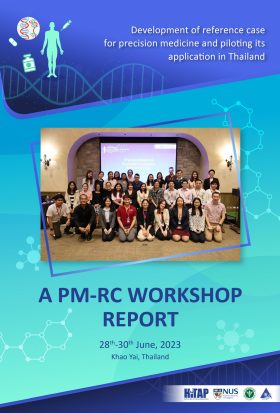This website uses cookies so that we can provide you with the best user experience possible. Cookie information is stored in your browser and performs functions such as recognising you when you return to our website and helping our team to understand which sections of the website you find most interesting and useful.
Report: Precision Medicine Reference Case Workshop in Thailand

Details
Executive summary
The rapidly evolving healthcare landscape is being shaped by cutting-edge technologies such as big data analytics, digital advancements, and genomics, leading to the emergence of Precision Medicine (PM). National genomics programs worldwide are embracing the potential of PM, signaling an imminent integration into healthcare systems.
However, PM interventions have considerable costs, fueling an ongoing discourse on their economic value to patients, society, and governments. To rationalize resource allocation for Research and Development (R&D) and healthcare reimbursement, a comprehensive health economic framework, encompassing both ‘early economic evaluation’ and ‘traditional economic evaluation,’ is essential.
Ensuring the accuracy and consistency of economic evaluations is pivotal. Addressing methodological challenges requires the establishment of reference cases (RC) that provide standardized guidance for the planning, execution, reporting, and assessment of economic evaluations. Building on previous work by research teams from the National University of Singapore (NUS) and the Health Intervention and Technology Assessment Program (HITAP) that performed a systematic review of cost utility analyses as well a narrative review of methodological recommendations for conducting economic evaluations on PM a beta reference case for PM was developed (PM-RC).
In order to receive feedback on the PM-RC and gather knowledge of existing work by different research teams, a two and a half-day workshop was held from June 28th to 30th, 2023, in Khao Yai, Thailand, organized by HITAP in collaboration with NUS and with support from the Health Strategy and Research Institute (HSRI) and the Ministry of Public Health (MoPH), Thailand.
Attended by distinguished health economists and clinical experts in PM from Singapore and Thailand, this workshop served as a platform to gather valuable feedback on the RC development process and generate interest among Clinical Implementation Pilot (CIP) teams to pilot their projects in Thailand for testing implementation of developed RC.
This report offers a concise overview of the workshop’s key activities, in-depth discussions, and significant outcomes from the stakeholder consultation. The insights received from diverse participant groups will be thoughtfully integrated into the evolving reference case. Additionally, the feasibility and relevance evaluation of each domain and sub-domain on the beta PM- RC by the participants, will act as a guide for refining the RC further. This report serves as a foundation for the revision and enhancement of the reference case for Precision Medicine. It is expected to be an impactful, standardized approach to economic evaluations, thereby ensuring the responsible advancement of PM in the dynamic healthcare landscape.




